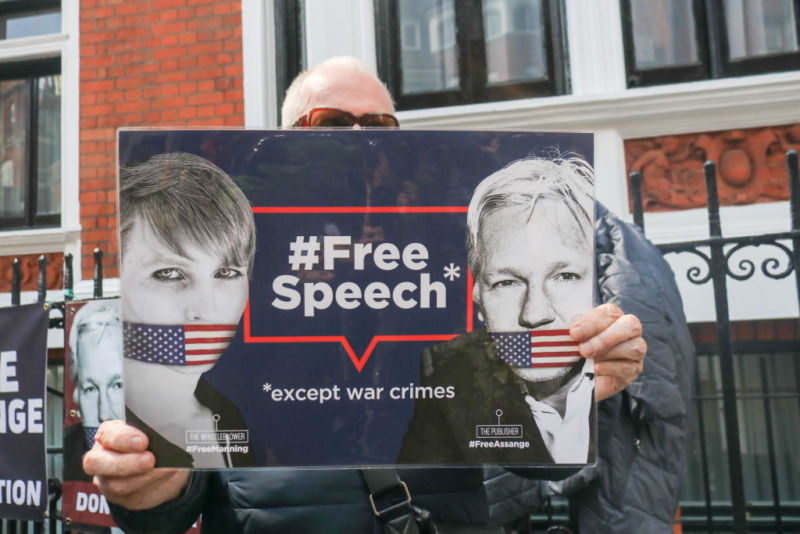
Today, the Department of Justice filed a new indictment of WikiLeaks founder Julian Assange with the US District Court in Alexandria, Virginia—adding 17 more charges atop the original hacking charge used to file for Assange's extradition from the United Kingdom. The new charges are all espionage-focused: conspiracy to receive, obtaining, and disclosure of "national defense information. Each of the 17 counts carries a potential prison sentence of up to 10 years.
In a statement announcing the filing, a Justice Department spokesperson said, "The superseding indictment alleges that Assange was complicit with Chelsea Manning, a former intelligence analyst in the US Army, in unlawfully obtaining and disclosing classified documents related to the national defense." The new counts allege, among other things, that Assange conspired with Manning to steal "national defense information," obtained that information from Manning, and "aided and abetted her in obtaining classified information with reason to believe that the information was to be used to the injury of the United States or the advantage of a foreign nation."
In a Twitter post, a WikiLeaks spokesperson wrote, "This is madness. It is the end of national security journalism and the First Amendment."
The charges will no doubt raise First Amendment arguments, as the laws they are based upon have been largely untested in court in cases against public disclosure.
In the indictment delivered by the grand jury—the same grand jury that Chelsea Manning went to jail for refusing to testify before—the Justice Department asserted that "Assange and WikiLeaks have repeatedly sought, obtained, and disseminated information that the United States classified due to the serious risk that unauthorized disclosure could harm the national security of the United States. WikiLeaks' website explicitly solicited censored, otherwise restricted, and until September 2010, 'classified' materials."
The indictment calls out Assange's repeated solicitations of specific sensitive data, including both unclassified but non-public sources and explicitly classified data. Assange's "Most Wanted Leaks" were cited, which included:
- Intellipedia—the intelligence community's shared database of open source intelligence maintained by the CIA Open Source Center;
- Other "Bulk Databases" of military and intelligence data
- Classified "Military and Intelligence" documents, including "Iraq and Afghanistan Rules of Engagement 2007-2009 (SECRET);" operating and interrogation procedures at Guantanamo Bay, Cuba; documents relating to Guantanamo detainees;
- CIA detainee interrogation videos; and
- Information about certain weapons systems
"Assange intended the 'Most Wanted Leaks' list to encourage and cause individuals to illegally obtain and disclose protected information, including classified information, to WikiLeaks contrary to law," the indictment states.
The indictment asserts that Assange published classified documents that "contained the unredacted names of human sources who provided information to United States forces in Iraq and Afghanistan and to US State Department diplomats around the world," the Justice Department spokesperson said. "These human sources included local Afghans and Iraqis, journalists, religious leaders, human rights advocates, and political dissidents from repressive regimes." The indictment claims that Assange "created a grave and imminent risk that the innocent people he named would suffer serious physical harm and/or arbitrary detention."
The indictment even links WikiLeaks to Osama bin Laden and noted that the Taliban used WikiLeaks documents to hunt down informants working for the US military and Afghan government. When US Navy SEALs raided bin Laden's compound on May 2, 2011, the indictment states:
They collected a number of items of digital media, which included the following: (1) a letter from bin Laden to another member of the terrorist organization al-Qaeda in which bin Laden requested that the member gather the DoD material posted to WikiLeaks, (2) a letter from that same member of al-Qaeda to Bin Laden with information from the Afghanistan War Documents provided by Manning to WikiLeaks and released by WikiLeaks, and (3) Department of State information provided by Manning to WikiLeaks and released by WikiLeaks.
Assange is currently jailed in London, serving a sentence for breaching his bail while facing extradition to Sweden on sexual assault charges. Swedish authorities have also begun to seek Assange's extradition on some of the rape charges. The new indictment comes before the US has formally filed for Assange's extradition—which the US must do by June 11.
reader comments
469